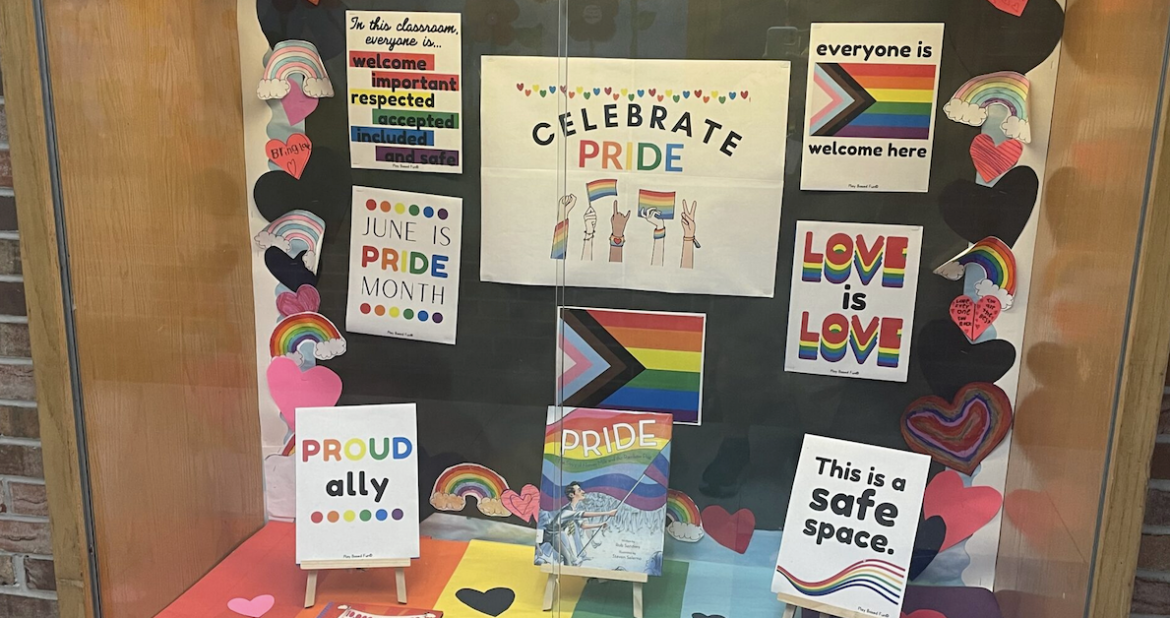Laura Bettenhausen identified as queer and nonbinary, but their process of self realization had a delayed start. Growing up, Bettenhausen didn’t have the support or representation necessary to learn about LGBTQIA+ identities in school and, consequently, didn’t find their true self until their freshman year of college.
“I think there was like one gay guy in middle school that I knew of, so I just think it wasn’t even on my radar, especially the gender stuff,” Bettenhausen said.
Now in their junior year, Bettenhausen fears for the future transgender rights in the very college town that allowed their initial gender exploration.
On Oct. 12, the Republican-controlled Wisconsin Assembly signed off on three bills that would restrict that right for trangender minors to receive gender affirming care or participate in school sports. Although Wisconsin’s governor, Tony Evers, vowed to veto the bills–and did ultimately veto one of the bills–that would have restricted minors access to gender-affirming healthcare, the existence of and support shown for the proposed legislation created rhetoric harmful to trans youth and their families, according to LGBTQIA+ advocates.
However, with training through the Human Rights Campaign and the creation of safe spaces like Gender and Sexuality Alliances, the Madison Metropolitan School District (MMSD) has put in year-round efforts to support LGBTQIA+ students.
What do these bills entail?
Assembly Bill 465, which was vetoed by the governor, targeted gender affirming care, seeking to ban minors from receiving medical care and directing Wisconsin’s medical board to revoke licensing from doctors who provide these services to anyone under age 18.
Assembly Bills 377 and 378, both approved by the Assembly, would permit high school and college athletes to participate in school sports only if they are a part of the team that matches the gender they were assigned at birth. The bill asserts that without these restrictions, trans participants would pose the risk of injuring other students or having an unfair advantage.
The bills passed in the Assembly by 63-35 votes, with no votes of support from Democratic representatives, according to the Associated Press.
What do these proposed bills mean for trans youth?
The mere existence of and support shown for these bills impacted trans youth and their support systems, according to advocates.
During the legislative hearing for the bills, Assembly Speaker Robin Vos likened gender affirming care to a lobotomy, saying that although gender affirming care may seem like the scientific answer now, it would be discredited in the future, according to the Associated Press.
Yet, Kal Wogahn, a Madison-based trauma therapist, considered gender affirming care to be lifesaving treatment for gender dysphoria, which is distress related to aspects of physical appearance that have to do with gender.
Bettenahusen has experienced dysphoria and fears for any child being forced to go through the same experience.
“Gender dysphoria is really bad. It’s like you wanna crawl outside of your own body. You just feel so detached from yourself and that’s scary,” Bettenhausen said. “A kid having to go through that and then being told they can’t do anything about it is terrifying to me.”
In addition to the heightened risk of dysphoria that comes with the push to ban gender affirming care for minors, John Peschl, the LGBTQIA+ teacher leader for MMSD, said these bills and the conversations that stem from them contribute to a heightened risk of mental health problems.
“We know that this rhetoric is one of the reasons why there’s a mental health crisis within our young people. We know there are increases in anxiety, there are increases in absenteeism within schools, and so we know that these are connected in some ways. But I think the impact is felt in different ways,” Peschl said.
A 2023 poll by the Trevor Project enforced this correlation, with 86% of trans and non-binary youth respondents saying that anti-trans bills and the debate surrounding them have had negative effects on their mental health.
But the impacts from these bills are not limited to trans youth. Sean O’Brien was an advocacy and organizing strategist at Fair Wisconsin, an organization dedicated to advancing, achieving and protecting LGBTQIA+ equality from a local level. According to him, the proposed legislation also sparks fear and anxiety for the families of trans kids.
“I had a mom call me, and this was a few days before a hearing on banning medical care. She was crying and said, ‘I just moved up here to get out of a state that had passed these harmful bills. And now I read that Wisconsin is going to have passed these harmful bills. I have a trans kid, who I want to make sure has access to health care. Do I leave the state? What do I do for my family?”’ O’Brien said.
How Madison schools are stepping in
In the MMSD, the LGBTQIA+ Teacher leader position was created to combat the increasingly difficult political environment created by bills like AB465, AB377 and AB378.
“The position is designed to focus on making sure that all students are seen and heard and loved within MMSD,” Peschl said.
The LGBTQIA+ teacher leader role had only been implemented in two Wisconsin cities, Milwaukee and Madison. The role was first implemented in Madison about 15 years ago, according to Peschl.
Peschl and additional MMSD staff worked to create an accepting environment for students in two big ways: by providing Welcoming Schools training for elementary school teachers and working with Gender and Sexuality Alliances (GSAs) in middle and high schools.
Welcoming Schools Training, created by a division of the Human Rights Campaign, focuses on professional development for educators to be a support system for the LGBTQIA+ community. This training helped build allyship in Madison’s elementary schools, according to Peschl.
GSAs provided an inclusive space for middle and high school students to connect with each other, and Peschl emphasized that this opportunity for connection was an essential resource for students.
“We know that in schools, when you connect with people or even see yourself in other people, that increases the quality of your day,” Peschl said, “that allows you to want to go to school, to want to apart of it, and feel like it is a good place for you.”
MMSD had four goals for their 2023 LGBTQIA+ inclusion efforts: to increase supportive signage in buildings, to honor pronouns and respond effectively to cases of misgendering, to ensure that all gender restrooms are always available for students, and more broadly, to implement the best teacher practices to support all students in the classroom.
These goals were created after gathering feedback from GSAs and students, presenting that feedback to a larger team, and then looking at research to see what areas they would best improve in, according to Peschl.
The impact of these programs
Spaces like GSAs provided LGBTQIA+ students with a support network that differs from what they encounter at home, which Wogahn explained, is a crucial tool for young people.
“It really helps for teens to have that outside of their family structures…because teenagers developmentally, from a psychological perspective, are just starting to learn to differentiate themselves from their families,” Wogahn said. “It’s helpful to go out in the world and see that ‘Oh, it’s okay to explore.’”
The LGBTQIA+ peers gained from GSAs create essential support networks, because they give students representation that proves it is possible to live authentically.
“Having support systems out there, having safe spaces in schools, is saving lives for queer and trans youth,” O’Brien said. “Having people who are comfortable and willing to say this is who I am, it changes the opinions of people around them. It shows people that there is hope, that there is a future.”
According to Bettenhausen, the reminder that they’re not alone is one of most important ways to support trans kids in response to the recent political debates.
“There are people out there like you too, I think that is an important message. You’re not the only person who feels that way,” Bettenhausen said.
In addition to the alternative modes of support, GSAs act as a message to students that their school, the place where they spend a majority of their formative years, are spaces that support and celebrate them.
In Madison schools, students now know that their school leaders believe their human rights are not up for debate, according to Peschl.






